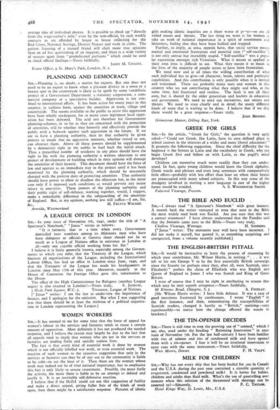PLANNING AND DEMOCRACY
Six,—Planning is, no doubt, a matter for experts. But one does. not need to be an expert to know when a pleasant district in a town or a beauty spot in the countryside is likely to be spoilt by some vandalistic project of a Government Department, a statutory corporation, a com- mercial company or a speculative builder. Aggression is not con- fined to international affairs. It has been active for many years in this country, in ruthless form, against the amenities of town, village and countryside. The means available to the public to resist this aggression have been wholly inadequate, for in many cases legitimate local oppo- sition has been defeated. The acid test therefore for Government planning-schemes, in so far as they are concerned with the protection of amenities, will be whether they honestly and effectively provide the public with a bulwark against such aggression in the future. If we are to have a planning authority, then let that authority be given powers so ample that no aggressive interests, whether vested or not, can obstruct them. Above all those powers should be supplemented by a democratic right in the public to hurl back the initial attack. Thus a prescribed numbe of residents in any place should have the right to file with the planning authority a written objection to any project of development or building which in their opinion will damage the amenities of their locality. This document should have the force of law and operate as an immediate stay in the project until it has been examined by the planning authority, which should be statutorily charged with the positive duty of protecting amenities That authority should have power to allow or disallow the objection but, in the latter case only if it imposed such conditions as would prevent any major injury to amenities. These powers of the planning authority and their public right of self-defence, working together, would, I suggest, make a remarkable difference in the safeguarding of the amenities of England. But, in my opinion, nothing less will suffice —I am, Sir,






















 Previous page
Previous page